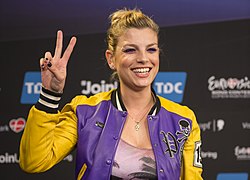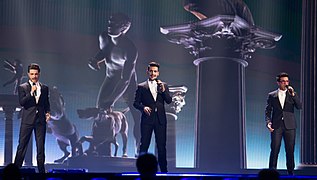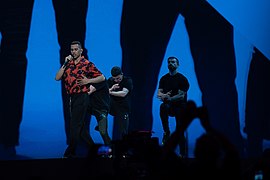Italy at the Eurovision Song Contest
This article deals with the history of Italy as a participant in the Eurovision Song Contest .
Regularity of participation and successes in competition
Italy took part in the first Eurovision Song Contest in 1956. However, apart from the Swiss victory, the remaining placements were never announced. In 1957 Italy reached sixth place out of ten participants. But in 1958 Italy was able to achieve third place with Domenico Modugno. In the years that followed, the country was at least always able to achieve a place in the top ten. In 1963 the next third place could be achieved. In 1964, Italy achieved its first victory at the ESC with Gigliola Cinquetti and her song Non ho l'età . In 1965 Italy was able to reach fifth place as hosts.
In 1966 Domenico Modugno competed for Italy for the third time. This time, however, he was unsuccessful and ended up with 0 points together with Monaco in last place and thus achieved the worst position in Italy at the ESC until then. In the years that followed, the rankings of 11th in 1967, 10th in 1968 and 13th in 1969 were rather average. It was not until 1970 that the country was once again placed in the top ten. Until 1976, with the exception of 1973, Italy was always in the top ten. In 1974 Gigliola Cinquetti, who won the ESC for Italy in 1964, even achieved a second place, while Wess & Dori Ghezzi took a third place in 1975. From 1977 to 1979 Italy again only achieved average placings. While a sixth place was achieved in 1980, Italy stayed out of the ESC in 1981 and 1982. The reason for this was probably internal quarrels with the EBU .
In 1983 Italy returned, however. The return was then characterized by an average place. In 1984 and 1985, however, they again got two placements among the top ten. While 1986 was suspended due to a lack of interest and low ratings, Italy returned in 1987 and immediately reached third place, which was the fourth third place in Italy's ESC history. In 1988 the country performed again on average. From 1989 to 1992 Italy was very successful. Overall, Italy only achieved placements in the top ten and in 1990 with Toto Cutugno even the second win for Italy. In 1993 this successful period was over. Italy only came in an average of twelfth place. From 1994 to 1996, the country then suspended again due to a lack of interest and low audience ratings.
Participation in the Eurovision Song Contest 1997 only came about because the national television Rai had missed the cancellation deadline and otherwise would have had to pay high fines. Even so, Italy finished fourth on their return. From 1998, Italy then completely suspended and stayed away from the ESC every year until 2010. The reasons for this absence were never known.
On December 2, 2010 it was announced that Italy would like to participate in the competition again from 2011. With Italy's return, the Big 4 at that time became the Big 5 we know today , making Italy one of the largest donors of the competition alongside Germany, France, Spain and the United Kingdom. Italy's return in Düsseldorf was a complete success. Raphael Gualazzi took second place and thus the best position since the victory in 1990. Italy also won the jury voting in 2011, but was only able to get 11th place in the televoting. Italy was also successful in 2012 and 2013, taking two places in the top ten. In 2014, however, came a brief low point. Emma Marrone achieved Italy's worst result of all time in its history at the ESC in Copenhagen in 2014 with 21st place.
However, 2015 was again a complete success. Il Volo won the televoting and took 6th place in the jury voting, making them 3rd overall. With 292 points they got the highest score in Italy at the ESC to date. In 2016, Italy achieved only an average place with position 16. In 2017 Italy was able to achieve a place in the top ten again. In addition, Francesco Gabbani achieved a new point record for Italy at the ESC with 334 points, although Il Volo had only set a new point record two years earlier. In 2018 Italy also achieved a good ranking with 5th place. In 2019 the country achieved its best ranking since 2011 with second place. With 472 points, the singer Mahmood set a new point record for Italy, with which Mahmood achieved the best result since Italy's last victory in 1990. With the exception of 2014 and 2016, Italy has only placed in the top ten since returning in 2011.
With just one last place, two wins, three second places, five third places and many other places in the top ten, Italy is one of the most successful countries in the competition.
List of posts
Color legend: - 1st place. - 2nd place. - 3rd place. - Equal points with last place. - Eliminated in the semifinals / in the qualification / in the Eastern European preliminary decision. - no participation / not qualified. - Cancellation of the Eurovision Song Contest.
| year | Interpreter | Title Music (M) and Text (T) |
language | translation | final | Semi-final / qualification |
National preliminary decision |
||
|---|---|---|---|---|---|---|---|---|---|
| space | Points | space | Points | ||||||
| 1956 | Tonina Torrielli |
Amami se vuoi M: Vittorio Mascheroni; T: Mario Panzeri |
Italian | Love me if you want | k. A. / 14 | k. A. | Direct participation | Sanremo Festival 1956 | |
| Franca Raimondi |
Aprite le finestre M: Virgilio Panzuti; T: Pinchi |
Italian | Open the window | k. A. / 14 | k. A. | ||||
| 1957 | Nunzio Gallo |
Corde della mia chitarra M: Mario Ruccione; T: Giuseppe Fiorelli |
Italian | Strings of my guitar | 6/10 | 7th | Sanremo Festival 1957 | ||
| 1958 | Domenico Modugno |
Nel blu dipinto di blu M: Domenico Modugno; T: Domenico Modugno, Franco Migliacci |
Italian | Blue painted in blue | 3/10 | 13 | Sanremo Festival 1958 | ||
| 1959 | Domenico Modugno |
Piove (ciao, ciao, bambina) M: Domenico Modugno; T: Dino Verde |
Italian | It's raining (ciao, ciao, girl) | 6/11 | 9 | Sanremo Festival 1959 | ||
| 1960 | Renato Rascel |
Romantica M: Dino Verde; T: Renato Rascel |
Italian | Romantic | 8/13 | 5 | Sanremo Festival 1960 | ||
| 1961 | Betty Curtis |
Al di là M: Carlo Donida ; T: Mogol |
Italian | Beyond | 5/16 | 12 | Sanremo Festival 1961 | ||
| 1962 | Claudio Villa |
Addio, addio M: Domenico Modugno; T: Franco Migliacci |
Italian | Bye Bye | 9/16 | 3 | Sanremo Festival 1962 | ||
| 1963 | Emilio Pericoli |
Uno per tutte M: Tony Renis ; T: Mogol, Alberto Testa |
Italian | One for all | 3/16 | 37 | Sanremo Festival 1963 | ||
| 1964 | Gigliola Cinquetti |
Non ho l'età M: Mario Panzeri, Gene Colonnello; T: Nicola Salerno |
Italian | I'm not old enough | 1 /16 | 49 | Sanremo Festival 1964 | ||
| 1965 | Bobby Solo |
Se piangi, se ridi M: Gianni Marchetti, Roberto Satti; T: Mogol, Roberto Satti |
Italian | When you cry when you laugh | 5/18 | 15th | Sanremo Festival 1965 | ||
| 1966 | Domenico Modugno |
Dio, come ti amo M / T: Domenico Modugno |
Italian | My god how much i love you | 17/18 | 0 | Sanremo Festival 1966 | ||
| 1967 | Claudio Villa |
Non andare più lontano M: Gino Mescoli; T: Vito Pallavicini |
Italian | Don't go any further | 11/17 | 4th | internal selection | ||
| 1968 | Sergio Endrigo |
Marianne M / T: Sergio Endrigo |
Italian | Marianne | 10/17 | 7th | internal selection | ||
| 1969 | Iva Zanicchi |
The large lacrime bianche M: Piero Soffici; T: Carlo Daiano |
Italian | Two big white tears | 13/16 | 5 | internal selection | ||
| 1970 | Gianni Morandi |
Occhi di ragazza M: Lucio Dalla; T: Sergio Bardotti, Gianfranco Baldazzi |
Italian | Girl eyes | 8/12 | 5 | internal selection | ||
| 1971 | Massimo Ranieri |
L'amore è un attimo M: Enrico Polito; T: Giancarlo Bigazzi , Gaetano Savio |
Italian | Love is a moment | 5/18 | 91 | internal selection | ||
| 1972 | Nicola di Bari |
I giorni dell'arcobaleno M: Piero Pintucci, Nicola di Bari; T: Dalmazio Masini |
Italian | The days of the rainbow | 6/18 | 92 | Sanremo Festival 1972 | ||
| 1973 | Massimo Ranieri |
Chi sarà M: Enrico Polito, Gaetano Savio; T: Giancarlo Bigazzi |
Italian | Who will be | 13/17 | 74 | internal selection | ||
| 1974 | Gigliola Cinquetti |
Sì M / T: Mario Panzeri, Daniele Pace, Lorenzo Pilat, Corrado Conti |
Italian | Yes | 2/17 | 18th | internal selection | ||
| 1975 | Wess & Dori Ghezzi |
Era M: Shel Shapiro; T: Andrea Lo Vecchio |
Italian | It was | 3/19 | 115 | internal selection | ||
| 1976 | Al Bano & Romina Power |
We'll Live It All Again M: Detto Mariano; T: Romina Power, Albano Carrisi |
English , Italian | We will see everything all over again | 7/18 | 69 | internal selection | ||
| 1977 | Mia Martini |
Libera M: Salvatore Fabrizio; T: Luigi Albertelli |
Italian | Free | 13/18 | 33 | internal selection | ||
| 1978 | Ricchi e Poveri |
Questo amore M: Dario Farina, Mauro Lusini; T: Sergio Bardotti |
Italian | This love | 12/20 | 53 | internal selection | ||
| 1979 | Matia Bazaar |
Raggio di luna M: Antonella Ruggiero, Piero Cassano, Carlo Marrale; T: Salvatore Stellita, Giancarlo Golzi |
Italian | Moonbeam | 15/19 | 27 | internal selection | ||
| 1980 | Alan Sorrenti |
Not so che darei M / T: Alan Sorrenti |
Italian | I don't know what I would give | 6/19 | 87 | internal selection | ||
|
1981 1982 |
No participation | ||||||||
| 1983 | Riccardo Fogli |
Per Lucia M: Maurizio Fabrizio ; T: Riccardo Fogli, Vincenzo Spampinato |
Italian | For Lucia | 11/20 | 41 | Direct participation | internal selection | |
| 1984 | Alice & Franco Battiato |
I treni di Tozeur M: Franco Battiato; T: Rosario Consentino, Giusto Pio |
Italian | Tozeur's trains | 5/19 | 70 | internal selection | ||
| 1985 | Al Bano & Romina Power |
Magic, Oh Magic M: Dario Farina, Michael Hoffmann; T: Cristiano Minellono |
Italian a. | Magical, oh how magical | 7/19 | 78 | internal selection | ||
| 1986 | No participation | ||||||||
| 1987 | Umberto Tozzi & Raf |
Gente di mare M: Umberto Tozzi, Raf; T: Giancarlo Bigazzi |
Italian | People of the sea | 3/22 | 103 | Direct participation | internal selection | |
| 1988 | Luca Barbarossa |
Vivo (ti scrivo) M / T: Luca Barbarossa |
Italian | I live (i write to you) | 12/21 | 52 | internal selection | ||
| 1989 | Anna Oxa & Fausto Leali |
Avrei voluto M: Franco Fasano; T: Franco Ciani, Franco Berlincioni |
Italian | I would have wanted | 9/22 | 56 | internal selection | ||
| 1990 | Toto Cutugno |
Insieme: 1992 M / T: Salvatore Cutugno |
Italian b. | Together: 1992 | 1 / 22nd | 149 | internal selection | ||
| 1991 | Peppino di Capri |
Comme è ddoce 'o mare M: Marcello Marocchi; T: Giampiero Artegiani |
Neapolitan | How sweet the sea is | 7/22 | 89 | internal selection | ||
| 1992 | Mia Martini |
Rapsodia M: Giuseppe Dati; T: Giancarlo Bigazzi |
Italian | rhapsody | 4/23 | 111 | internal selection | ||
| 1993 | Enrico Ruggeri |
Sole d'Europa M / T: Enrico Ruggeri |
Italian | European sun | 12/25 | 45 | internal selection | ||
|
1994 to 1996 |
No participation | ||||||||
| 1997 | Jalisse |
Fiumi di parole M: Fabio Ricci; T: Carmen Di Domenico, Alessandra Drusi |
Italian | Word flows | 4/25 | 114 | Qualified directly for the final | Sanremo Festival 1997 | |
|
1998 to 2010 |
No participation | ||||||||
| 2011 | Raphael Gualazzi |
Madness of Love M / T: Raphael Gualazzi |
Italian, English | Love madness | 2/25 | 189 | Qualified directly for the final | Sanremo Festival 2011 | |
| 2012 | Nina Zilli |
L'amore è femmina (Out of Love) M: Christian Rabb, Kristoffer Sjökvist, Frida Molander, Charlie Mason; T: Nina Zilli , Christian Rabb, Kristoffer Sjökvist, Frida Molander, Charlie Mason |
English, Italian | Love is feminine | 9/26 | 101 | Sanremo Festival 2012 | ||
| 2013 | Marco Mengoni |
L'essenziale M: Francesco de Benedittis, Roberto Casalino, Marco Mengoni ; T: Roberto Casalino |
Italian | The essentials | 7/26 | 126 | Sanremo Festival 2013 | ||
| 2014 | Emma |
La mia città M / T: Emma Marrone |
Italian | My city | 21/26 | 33 | internal selection | ||
| 2015 | Il Volo |
Grande amore M / T: Francesco Boccia, Ciro Esposito |
Italian | Great love | 3/27 | 292 | Sanremo Festival 2015 | ||
| 2016 | Francesca Michielin |
No Degree of Separation M: Fabio Gargiulo, Federica Abbate , Cheope; T: Francesca Michielin , Federica Abbate , Norma Jean Martine |
Italian, English | No degree of separation | 16/26 | 124 | Sanremo Festival 2016 | ||
| 2017 | Francesco Gabbani |
Occidentali's Karma M / T: Francesco Gabbani , Filippo Gabbani, Luca Chiaravalli |
Italian | Western karma | 6/26 | 334 | Sanremo Festival 2017 | ||
| 2018 | Ermal Meta & Fabrizio Moro |
Non mi avete fatto niente M / T: Ermal Meta , Fabrizio Moro , Andrea Febo |
Italian | You couldn't harm me | 5/26 | 308 | Sanremo Festival 2018 | ||
| 2019 | Mahmood |
Soldi M: Mahmood , Dardust , Charlie Charles ; T: Mahmood , Dardust |
Italian, Arabic | money | 2 / 26th | 472 | Sanremo Festival 2019 | ||
|
|
Diodato |
Fai rumore M: Antonio Diodato , Edwyn Roberts; T: Antonio Diodato |
Italian | You are loud |
Cancellation due to the COVID-19 pandemic by the EBU |
Sanremo Festival 2020 | |||
National qualifications
Up to and including 1966 and 1972, the winning titles of the Sanremo Festival were automatically the Italian contributions to the Eurovision Song Contest, and the interpreters also generally agreed (most of the songs in Sanremo, however, were presented in two versions by two different interpreters; of these, each one selected for the ESC). In 1956, as two contributions were submitted, the title in second place was also represented. In the years 1967 to 1969 one of the victorious Sanremo interpreters was selected as a representative for the Eurovision Song Contest, but with a new title. Until 1988, the Italian representatives were selected internally, in 1978 and 1985 it was - more by chance - the previous year's winners from Sanremo. In 1989 the winners of the festival were again the Italian representatives at the Grand Prix, but with a new song, also in 1993. In 1997 Jalisse won with Fiumi di Parole and traveled to Dublin with this song. In the remaining years, selection was also made internally.
After Italy returned in 2011, the performers up to and including 2013, including the title until 2012, were selected from among the participants in the Sanremo Festival. In 2014 Emma Marrone (2012 Sanremo winner) was selected internally to represent the country; their title was also determined internally. Since 2015, the winner of the Sanremo Festival has been given the right to represent Italy at the Song Contest with his winning title. However, the interpreter does not have to agree. The Stadio group won the Sanremo Festival 2016, but decided against participating, whereupon the Rai sent the runner-up Francesca Michielin to the ESC. In 2015 and since 2017, the winners agreed to participate.
Commercial success
Regardless of their performance, many Italian contributions were also internationally successful. The best known among them is probably Nel blu dipinto di blu (Volare) , which reached first place in the charts in Europe and also in the USA and also won the Grammy for best song in the same year . Other international hits were Piove (Ciao, ciao, bambina) , which was commercially successful in the original version and reached second place in the German charts by Caterina Valente , the first winning title Non ho l'età and Non so che darei aus the year 1980.
languages
Italy has remained very faithful to its national language over the years, with almost all contributions being sung entirely in Italian. The first exception was in 1976 when Romina Power and Al Bano's contribution was sung in English and Italian. In 1984 two lines of the song I treni di Tozeur were sung in German, in fact it was a movement from Mozart's Magic Flute . In 1985 Romina Power and Al Bano's second contribution was sung mainly in Italian, but with the English title line Magic, oh magic . In 1990 every chorus of the song Insieme ended: 1992 with the English words unite, unite, Europe . The Comme è ddoce 'o mare from 1991, performed in the Neapolitan dialect, is also linguistically remarkable .
In 2011 Raphael Gualazzi also brought a bilingual song. Madness of Love was sung around 50% in Italian and in English, as was L'amore è femmina (Out of Love) in 2012. In 2013 and 2014 the performers Marco Mengoni sang with L'essenziale and Emma Marrone with La mia città only in Italian. The contribution from 2015 Grande amore was also presented entirely in Italian. In 2016, however, Francesca Michielin decided to sing the originally Italian contribution Nessun grado di separazione in Stockholm, partly in Italian and in English. The title has been converted to No Degree of Separation in English . In 2017, 2018 and 2020 the Italian contributions were again presented in full in Italian. The 2019 contribution was mostly sung in Italian, but it also contains some words from Arabic . This was the first time the language appeared in an Italian contribution.
Competitions held
| year | city | venue | Moderation |
|---|---|---|---|
| 1965 | Naples | Rai di Napoli auditorium | Renata Mauro |
| 1991 | Rome | Studio 15 de Cinecittà | Gigliola Cinquetti & Toto Cutugno |
Scoring
The following countries received the most points from or awarded the most points to Italy (as of 2019):
|
|
|
|||||||||||||||||||||||||||||||||||||||||||||||||||||||||||||||
Award of the highest rating
Since 1975 Italy has given the highest number of points in the final to 19 different countries, five of which to Ireland. In the semi-finals, on the other hand, Italy awarded the maximum number of points to ten different countries, two of them to Albania, Romania and Ukraine.
|
|
|||||||||||||||||||||||||||||||||||||||||||||||||||||||||||||||||||||||||||||||||||||||||||||||||||||||||||||||||||||||||||||||||||||||||||||||||||||||||||||
various
- Toto Cutugno Insieme: 1992 is the only winning title in the competition with a current political reference at the time: It was about the Schengen Agreement .
- In 1974, the contest was not broadcast by the public radio and television company RAI, as it was feared that the contribution Sì (“Yes”) interpreted by Gigliola Cinquetti could lead to the referendum on the abolition of the old divorce law May should take place towards a positive election result.
- With Italy's return to the competition in 2011, the Big Four Spain , Germany , Great Britain and France were expanded to include Italy in the Big Five . The Italian entry is therefore always qualified for the final.
- If there had been a pure jury vote in 2011 , Italy would have won.
- If there had been a pure televoting vote in 2015 , Italy would have won.
- Italy is the only country in the competition that has achieved over 300 points three times in a row: 334 points (2017), 308 (2018) and 472 (2019).
Impressions
Individual evidence
- ↑ Italy applied for 2011 Eurovision Song Contest on eurovision.tv (accessed on December 2, 2010)
- ^ San Remo Festival 1951-2006
- ↑ Sanremo 2016, 5 cose da sapere sugli Stadio - Panorama. Retrieved August 22, 2016 (Italian).
- ↑ Charts Surfer: Song Search
- ^ I treni di Tozeur
- ↑ Insieme: 1992
- ^ Song Contest 1990 Eurovision Club Germany e. V .; Retrieved November 19, 2010
- ^ Song Contest 1974 Eurovision Club Germany e. V .; Retrieved November 19, 2010
- ↑ EBU reveals split televoting and jury results. In: eurovision.tv. May 26, 2011, accessed May 27, 2015 .
- ↑ The audience would have chosen a different winner. In: FAZ.net . May 24, 2015, accessed May 26, 2015 .













